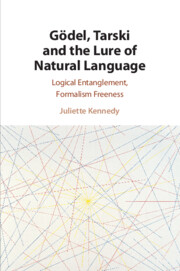3 - Computability: The Primary Example
Published online by Cambridge University Press: 03 December 2020
Summary
Computability is discussed here at length, beingthe prime example of what Gödel callsformalism independence in his 1946 Princeton Bicentennial Lecture. The emergence of the concept of human effective calculability and of its formal counterpart---simply computability---is traced in the work of Gödel, Chucrh, Hilbert and Bernays, and finally Turing. The reception of Turing’s work on the part of Church and Kleene as well as on the part of Gödel is chronicled.
Information
- Type
- Chapter
- Information
- Gödel, Tarski and the Lure of Natural LanguageLogical Entanglement, Formalism Freeness, pp. 39 - 60Publisher: Cambridge University PressPrint publication year: 2020
